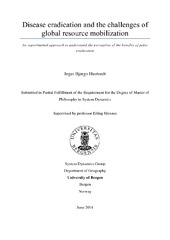| dc.description.abstract | The global effort to eradicate polio began in 1988. The target of the effort was to eradicate the disease by the year 2000, a target which was not attained. The annual number of polio cases has been reduced from 350,000 in 1988, to 650 in 2011. Research shows that financial setbacks are the main reason why polio has not yet been eradicated. When donor countries contribute less than the needed amount to eradicate, they signal that this effort is not in their interest. Cost-benefit analysis demonstrates that the high short term costs involved in the eradication effort are outweighed by the long term benefits of not needing to vaccinate the population. So why has polio not been eradicated? Studies show that even though a country would benefit from increasing its contribution, it will not do so unless other countries do the same. Using an experimental approach we have investigated how the level of contributions differs under two conditions: if contributions are made on behalf of one donor country or on behalf of the whole group of donor countries. We have also tested to see if information emphasizing the benefits of eradication will increase contributions. The results show a weak difference between contributions made when playing the role as the policy maker for a country compared to contributions made when playing the same role for the whole group. Information did not have an effect on the performance. The experimental group was made up of students playing the role of policy makers. The make-up of the experimental group may have affected the results of the experiment. Students may have a better understanding of long term benefits and base their decisions on different incentives than policy makers, resulting in the weak difference of treatments. However, there may also be misperceptions of long term benefits which need different corrections than written information can give. | en_US |
